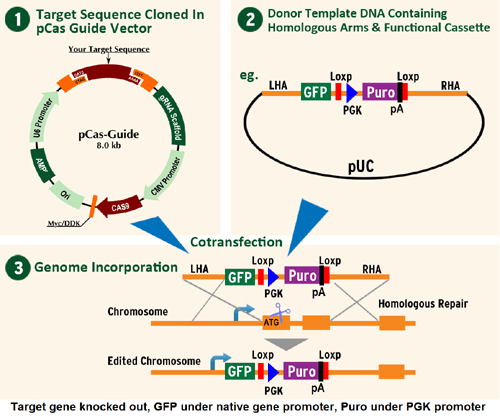ERO1LB (ERO1B) Human Gene Knockout Kit (CRISPR)
CAT#: KN208445
ERO1B - human gene knockout kit via CRISPR, HDR mediated
Functional Cassette: Luciferase-Puro RFP-BSD mBFP-Neo
HDR-mediated knockout kit validation
USD 1,657.00
4 Weeks*
Specifications
| Product Data | |
| Format | 2 gRNA vectors, 1 GFP-puro donor, 1 scramble control |
| Donor DNA | GFP-puro |
| Symbol | ERO1LB |
| Locus ID | 56605 |
| Components |
KN208445G1, ERO1LB gRNA vector 1 in pCas-Guide CRISPR vector KN208445G2, ERO1LB gRNA vector 2 in pCas-Guide CRISPR vector KN208445D, donor DNA containing left and right homologous arms and GFP-puro functional cassette. GE100003, scramble sequence in pCas-Guide vector |
| Disclaimer | These products are manufactured and supplied by OriGene under license from ERS. The kit is designed based on the best knowledge of CRISPR technology. The system has been functionally validated for knocking-in the cassette downstream the native promoter. The efficiency of the knock-out varies due to the nature of the biology and the complexity of the experimental process. |
| Reference Data | |
| RefSeq | NM_019891 |
| UniProt ID | Q86YB8 |
| Synonyms | DKFZp779C1042; DKFZp779I0141; FLJ11003 |
| Summary | Oxidoreductase involved in disulfide bond formation in the endoplasmic reticulum. Efficiently reoxidizes P4HB/PDI, the enzyme catalyzing protein disulfide formation, in order to allow P4HB to sustain additional rounds of disulfide formation. Other protein disulfide isomerase family members can also be reoxidized, but at lower rates compared to P4HB, including PDIA2 (50% of P4HB reoxidation rate), as well as PDIA3, PDIA4, PDIA6 and NXNDC12 (<10%). Following P4HB reoxidation, passes its electrons to molecular oxygen via FAD, leading to the production of reactive oxygen species (ROS) in the cell. May be involved in oxidative proinsulin folding in pancreatic cells, hence may play a role in glucose homeostasis.[UniProtKB/Swiss-Prot Function] |
Documents
| Product Manuals |
| FAQs |
| SDS |
Resources
Other Versions
| SKU | Description | Size | Price |
|---|---|---|---|
| KN208445BN | ERO1LB - human gene knockout kit via CRISPR, HDR mediated |
USD 1,657.00 |
|
| KN208445LP | ERO1LB - human gene knockout kit via CRISPR, HDR mediated |
USD 1,657.00 |
|
| KN208445RB | ERO1LB - human gene knockout kit via CRISPR, HDR mediated |
USD 1,657.00 |
|
| KN408445 | ERO1B - KN2.0, Human gene knockout kit via CRISPR, non-homology mediated. |
USD 1,657.00 |
|
| GA111197 | ERO1B CRISPRa kit - CRISPR gene activation of human endoplasmic reticulum oxidoreductase 1 beta |
USD 1,657.00 |
{0} Product Review(s)
Be the first one to submit a review






























































































































































































































































 Germany
Germany
 Japan
Japan
 United Kingdom
United Kingdom
 China
China
